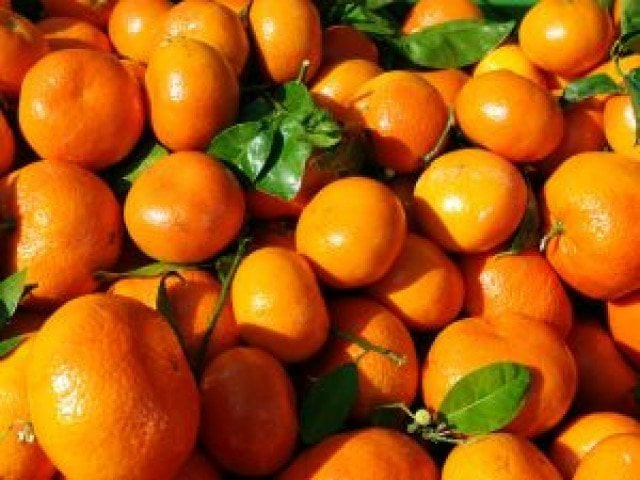Kinnow exports to go down this season
Exporters set lower target due to stiff competition in global market

PHOTO: FILE
In a statement on Saturday, Ahmed said the country’s kinnow exports would be lower by 50,000 tons in the current fiscal year compared to the previous year because Pakistan’s competitors were giving it a tough time in the international market.
“Exports of kinnow from Pakistan have just commenced and exporters have set a target of 300,000 tons for the current season, which is expected to fetch $194 million in foreign exchange,” he said. “Of the expected production of 2.2 million tons, around 15-20% will be exported.”
Pakistani exporters focus less on the European market as they fear imposition of a ban on the country’s fruits due to substandard quality. This also makes other countries cautious. He disclosed that the exporters had intentionally stopped exports of kinnow to Europe, fearing a ban over quality issues.
Majority of Pakistan’s kinnow was exported to Russia but last year Pakistani businessmen suffered hefty losses because competing countries offered better varieties at lower prices, he pointed out.
Ahmed added that due to the stiff competition in Russia, the exporters had to sell kinnows at a price lower than the actual shipment cost, which caused a loss of around $6 million.
“Keeping in mind the huge loss, the exporters have reduced the export target for the current season by 50,000 tons,” said Ahmed. “Kinnow exporters from competing countries are given subsidies by their respective governments while Pakistani exporters can only wish for such privileges.”
Exports of Kinnow to Iran discontinued nine years ago due to which Pakistan faced a yearly dent of $40 million in revenues as it had exported around 80,000-90,000 tons of kinnow to the neighbour annually.
He argued that if Iran could export tomatoes and other edible items to Pakistan, then why Pakistan could not ship kinnow.
The official underscored the need for close coordination and cooperation among shipping companies, ministries and departments concerned to achieve the export target of 300,000 tons.
“If there are no disturbances in kinnow supply or transportation-related issues, we will leave no stone unturned to surpass the export target,” he emphasised.
Lamenting that kinnow farms in Pakistan had completed their lifecycles, he stressed the need for harvesting new varieties of citrus fruit.
“The season of citrus fruit is limited to four months, however, with the production of new varieties, it can be extended to eight months, which means exporters will have a longer time frame to export and increase the export volume,” Ahmed said.
However, he cautioned that the establishment of new orchards could take four to five years.
Published in The Express Tribune, December 8th, 2019.
Like Business on Facebook, follow @TribuneBiz on Twitter to stay informed and join in the conversation.



















COMMENTS
Comments are moderated and generally will be posted if they are on-topic and not abusive.
For more information, please see our Comments FAQ